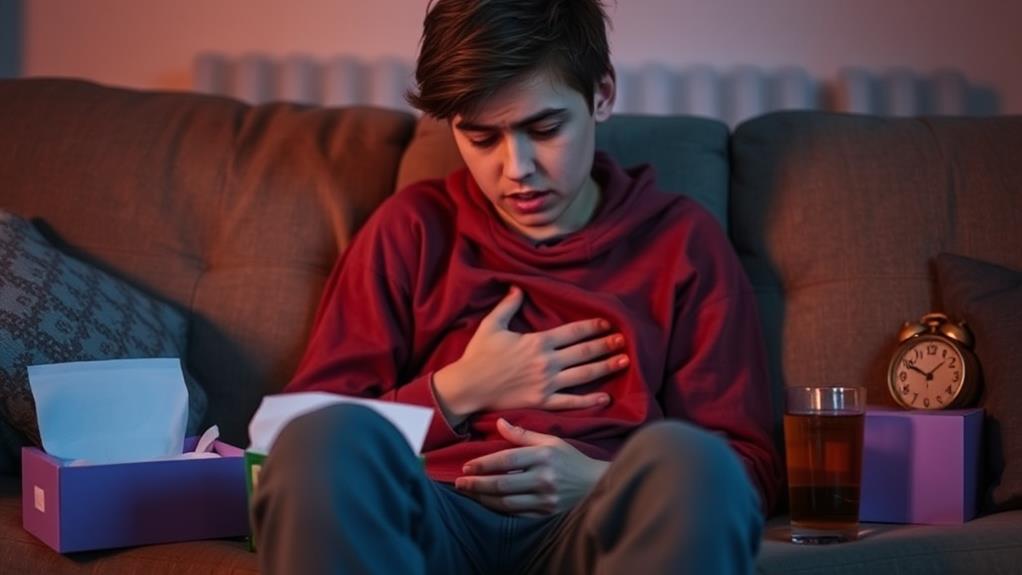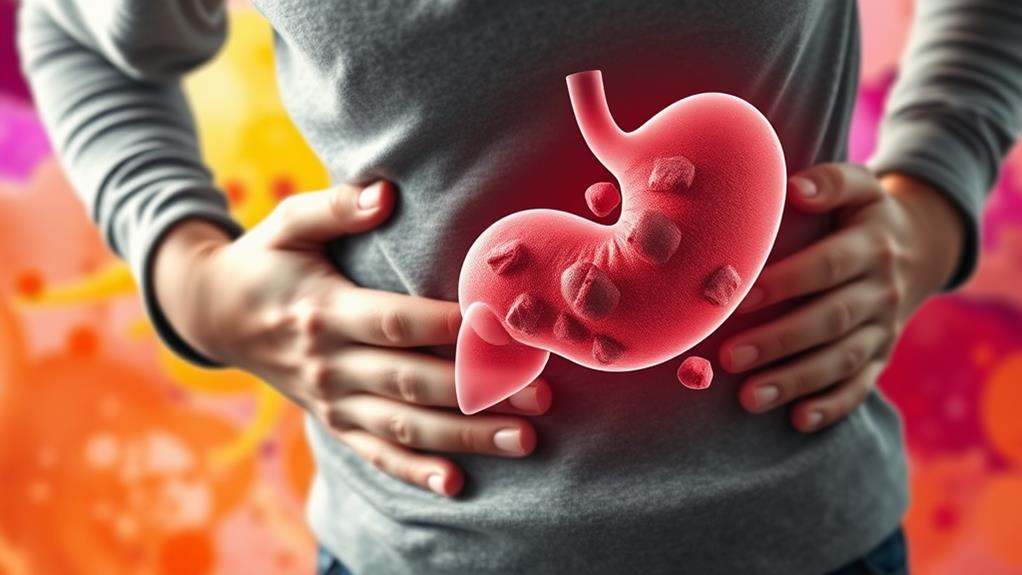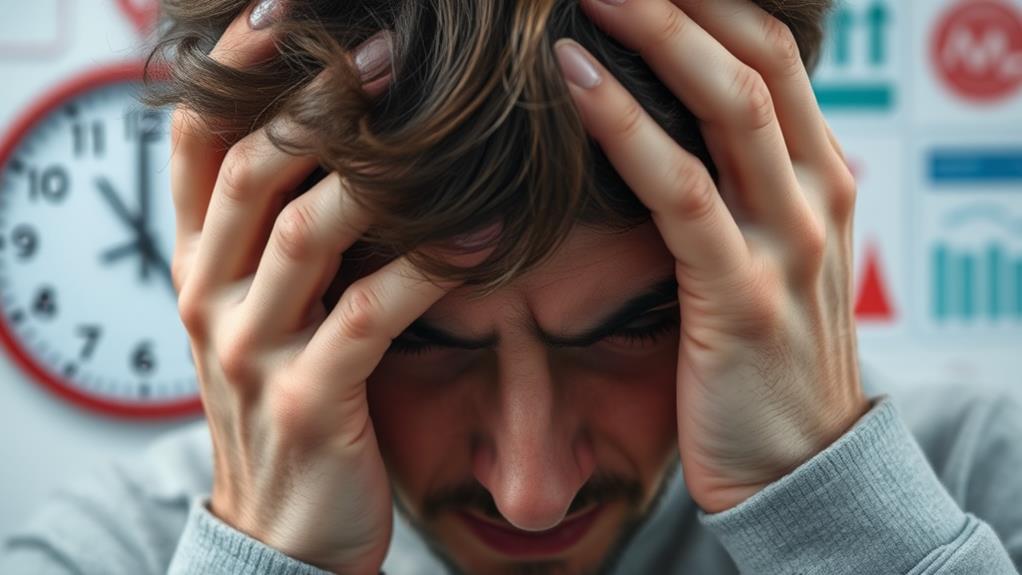13 Common Causes of Teen Abdominal Pain
If you've ever experienced abdominal pain as a teen, you know how disruptive it can be. It might stem from something as simple as overeating, or it could signal a more serious issue like appendicitis. Understanding the various causes is crucial, as it can help you identify when it's time to seek medical attention. From gastrointestinal disorders to stress-related discomfort, the range of potential causes is broad. Curious about what might be causing that nagging pain? There are several common culprits that deserve your attention.
Gastroenteritis

Gastroenteritis, commonly known as the stomach flu, often strikes unexpectedly, leaving teens with cramping abdominal pain, nausea, and diarrhea. This condition can be caused by several factors, including viral infections, bacteria, or parasites. You might've heard about norovirus or rotavirus; these are some of the most common culprits.
When you catch gastroenteritis, it usually spreads through contaminated food or water. You can also get it from close contact with someone who's infected. If you find yourself feeling feverish, having headaches, or experiencing fatigue alongside those tummy troubles, it's likely due to this pesky virus.
Staying hydrated is key when dealing with gastroenteritis. Drinking clear fluids, like water or broth, can help replace lost fluids and electrolytes. It's a good idea to avoid sugary or caffeinated drinks, as they may worsen your symptoms.
Most importantly, listen to your body. Resting will help you recover faster. Since gastroenteritis is often self-limiting, you can usually expect to feel better within a few days.
If symptoms persist or worsen, don't hesitate to reach out to a healthcare professional for guidance.
Appendicitis
Abdominal pain can have various causes, and while gastroenteritis is often a common culprit, another serious condition to consider is appendicitis. This condition occurs when your appendix, a small pouch attached to your large intestine, becomes inflamed. If you're feeling a sharp pain in your lower right abdomen, it could be a sign of appendicitis.
You might also notice other symptoms like nausea, vomiting, or a loss of appetite. Sometimes, the pain starts around your belly button and then shifts to the right side. If you experience these symptoms, it's important to seek medical attention quickly. Ignoring the signs can lead to a ruptured appendix, which can be life-threatening.
Doctors usually diagnose appendicitis through physical exams, blood tests, or imaging tests like an ultrasound or CT scan. If appendicitis is confirmed, surgery is often needed to remove the appendix.
While the thought of surgery can be scary, it's a common procedure with a high success rate. So, if you think you might've appendicitis, don't hesitate to talk to a healthcare professional. They can help you get the care you need!
Irritable Bowel Syndrome

Many teens experience the discomfort of Irritable Bowel Syndrome (IBS), a common gastrointestinal disorder. If you've ever felt cramping, bloating, or sudden urges to go to the bathroom, you might be dealing with IBS. This condition affects how your intestines function, leading to irregular bowel movements and uncomfortable symptoms.
While the exact cause of IBS isn't fully understood, stress, diet, and even family history can play a role. Many teens find that certain foods, like dairy or spicy dishes, can trigger their symptoms. You might also notice that anxiety or stressful situations make things worse.
It's important to listen to your body and pay attention to when these symptoms arise. Keeping a food diary can help you identify triggers and patterns.
Talking to a healthcare provider can offer you strategies for managing IBS, including dietary changes and stress management techniques. Remember, you're not alone in this, and many people understand what you're going through.
With the right approach, you can learn to manage your symptoms and continue enjoying life without letting IBS hold you back.
Constipation
When you're feeling sluggish and uncomfortable, constipation might be the culprit. It happens when your bowel movements become infrequent or difficult, leaving you feeling bloated and irritated. You might notice that you're going fewer than three times a week, and your stools can be hard and painful to pass. This can lead to abdominal pain, as your body struggles to push out the waste.
Several factors can cause constipation in teens. A lack of fiber in your diet, not drinking enough water, or skipping physical activity can all contribute. Stress and certain medications can also play a role. When you're busy with school or social activities, it's easy to overlook these healthy habits, but they're crucial for your digestive health.
To tackle constipation, start by increasing your fiber intake with fruits, vegetables, and whole grains. Drinking plenty of water is essential too—aim for at least eight glasses a day. Adding regular exercise into your routine can also help keep things moving.
If you find that these changes don't help, it's a good idea to talk to a healthcare professional for further advice. Remember, taking care of your body is key to feeling your best!
Food Allergies

Food allergies can significantly impact your daily life, leading to unexpected and uncomfortable abdominal pain. If you have a food allergy, your body reacts negatively to certain foods, which can cause a range of symptoms, including cramping, bloating, and diarrhea. Common culprits include nuts, dairy, eggs, wheat, and shellfish.
When you eat something you're allergic to, your immune system mistakenly identifies it as a threat. This reaction can trigger inflammation in your digestive system, resulting in pain that can interrupt your day. You might feel fine one moment and then suddenly experience intense discomfort after eating.
It's crucial to pay attention to what you eat. Keeping a food diary can help you track your meals and identify any patterns related to your symptoms. If you suspect you have a food allergy, consult with a healthcare professional who can guide you through testing and management options.
Avoiding trigger foods is key, and being aware of ingredients when dining out can make a big difference. By taking these steps, you can minimize discomfort and enjoy your meals without the worry of unexpected pain.
Peptic Ulcers
While food allergies can lead to significant abdominal discomfort, another potential cause of pain is peptic ulcers. These are sores that develop on the lining of your stomach or the first part of your small intestine. You might experience sharp, burning pain, usually between meals or at night.
It's important to pay attention to when that pain happens, as it can help you and your doctor identify the problem.
Peptic ulcers are often caused by an infection with a bacterium called Helicobacter pylori or by the long-term use of nonsteroidal anti-inflammatory drugs (NSAIDs). If you're feeling bloated, nauseous, or notice changes in your appetite, it's a good idea to talk to a healthcare professional.
They can perform tests to determine if you have an ulcer and suggest treatments, which may include medications to reduce stomach acid and antibiotics if an infection is present.
Taking care of your stomach is crucial, so don't ignore any persistent pain. By being aware of the symptoms and seeking help when needed, you can manage your health effectively and get back to feeling your best.
Gallstones

Gallstones can strike suddenly, causing intense pain in the upper right abdomen or back. These small, hard deposits form in your gallbladder, which is a pouch that stores bile—a digestive fluid. When you eat, your gallbladder releases bile to help break down fats. However, if there's too much cholesterol or bilirubin in your bile, it can lead to the formation of gallstones.
You might experience sharp pain that lasts for several minutes or longer, especially after meals high in fat. Other symptoms can include nausea, vomiting, and even jaundice, where your skin or eyes turn yellow. If you notice these signs, it's essential to talk to a healthcare professional right away.
Gallstones can affect anyone, but certain factors like a high-fat diet, obesity, or family history can increase your risk.
While some people may not need treatment, others might require medications or even surgery to remove the gallbladder.
Menstrual Cramps
Many teens experience menstrual cramps, also known as dysmenorrhea, as a common part of their monthly cycle. These cramps usually occur in the lower abdomen and can range from mild to severe. They're caused by the uterus contracting to shed its lining, which can lead to discomfort and pain.
You might notice that these cramps often start one to two days before your period and can last for a few days into it.
If you're dealing with menstrual cramps, there are several ways to manage the pain. Over-the-counter pain relievers, like ibuprofen or naproxen, can be effective. Heat therapy, such as a heating pad or hot water bottle on your abdomen, can also provide relief.
Staying active, even with light exercise, can help ease the discomfort too. It's important to listen to your body and find what works best for you.
If your cramps become unbearable or interfere with your daily activities, don't hesitate to talk to a healthcare professional. They can help determine if there's an underlying issue or suggest other treatment options.
Hernia

Sometimes, abdominal pain can be caused by a hernia, which occurs when an organ or tissue pushes through a weak spot in the abdominal wall. This condition can happen in various areas, but it's most common in the groin or belly button.
If you've been feeling discomfort, it's important to pay attention, as you might notice a bulge or swelling where the hernia is.
There are several reasons why hernias can develop. Heavy lifting, persistent coughing, or straining during bowel movements can put pressure on your abdomen, making it easier for a hernia to form.
You might find yourself feeling pain, especially when bending over or lifting objects. If the hernia becomes trapped, it can lead to serious complications, which is why it's crucial to seek medical advice if you suspect you have one.
Treatment often involves surgery to repair the weak spot in the abdominal wall. While the thought of surgery might seem daunting, it's a common procedure, and doctors can guide you through the process.
Urinary Tract Infection
If you're experiencing abdominal pain, it might be time to consider a urinary tract infection (UTI). UTIs can cause discomfort in your lower abdomen, often accompanied by a strong urge to urinate or a burning sensation while doing so.
You might also notice changes in your urine, like a cloudy appearance or a strong odor. These infections occur when bacteria enter the urinary tract, causing inflammation and irritation.
Teen girls are particularly prone to UTIs due to their anatomy, but boys can get them too. If you've recently had a UTI or are sexually active, your chances may increase.
It's essential to pay attention to other symptoms as well. Fever, back pain, or even chills can indicate a more severe infection that needs immediate medical attention.
If you suspect a UTI, don't hesitate to reach out to a healthcare provider. They'll likely recommend a urine test to confirm the infection and may prescribe antibiotics to help you feel better.
Stress and Anxiety

While a urinary tract infection can certainly cause abdominal discomfort, stress and anxiety can also manifest as physical pain in the abdomen. When you're feeling overwhelmed with schoolwork, social pressures, or family issues, your body often reacts in ways you mightn't expect. You may notice tightness, cramping, or even sharp pains in your stomach, and it can be confusing.
It's important to realize that your mind and body are closely connected. When you're anxious or stressed, your brain sends signals that can lead to changes in your digestive system. This might result in nausea or a feeling of heaviness in your gut. You might think it's just bad food, but it could be your body's way of expressing emotional strain.
Managing stress is vital for your overall health. Try to identify what's causing your anxiety. Practicing relaxation techniques, like deep breathing or mindfulness, can make a big difference.
Viral Infections
Many teens experience abdominal pain due to viral infections, which can strike unexpectedly and cause a range of discomforts. You might feel cramping, bloating, or sharp pain, and these symptoms often accompany other signs like fever, nausea, or diarrhea.
Common viral infections include the flu, norovirus, and even some colds. When your body fights off these viruses, it can lead to inflammation in your stomach and intestines, resulting in that pesky pain.
If you're feeling unwell, it's essential to pay attention to your symptoms. Resting and staying hydrated can help you recover faster.
Although many viral infections resolve on their own, it's crucial to seek medical advice if your abdominal pain is severe, lasts more than a few days, or is accompanied by other concerning symptoms like blood in your stool or persistent vomiting.
Overeating

Abdominal pain can also arise from overeating, a common issue for teens during social gatherings or celebrations. When you indulge in that extra slice of pizza or pile on the snacks at a party, your stomach can quickly become overwhelmed. This overconsumption stretches your stomach beyond its normal capacity, leading to discomfort and pain.
You might feel bloated or experience sharp cramps as your digestive system struggles to process all that food. It's not just about the quantity; rich and fatty foods can exacerbate the situation. Your body needs time to digest, and by overeating, you're putting it under pressure.
Additionally, eating too quickly can cause you to swallow air, making the problem worse. To avoid this discomfort, try to eat slowly and listen to your body's hunger cues. It's okay to enjoy your favorite foods, but moderation is key.
If you find yourself feeling pain after meals frequently, it might be worth talking to a doctor. They can help rule out any underlying issues and offer tips on how to maintain a balanced diet. Remember, taking care of your body today sets the stage for a healthier tomorrow!













Post Comment